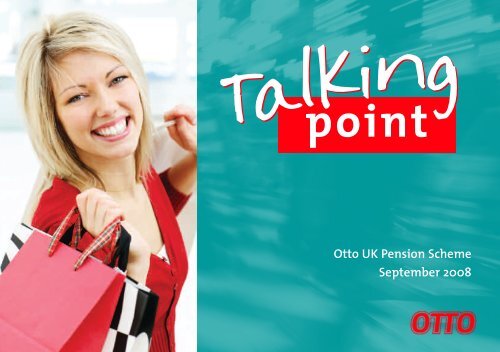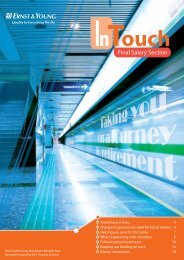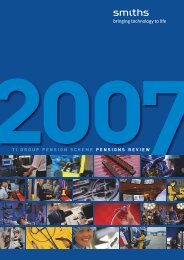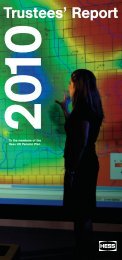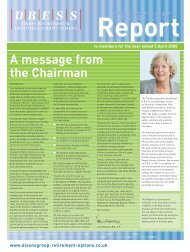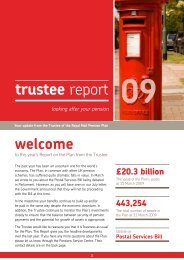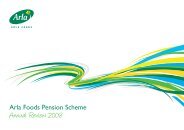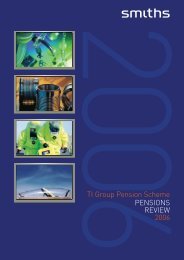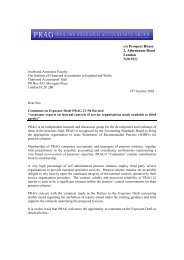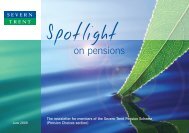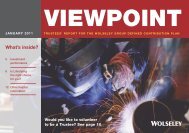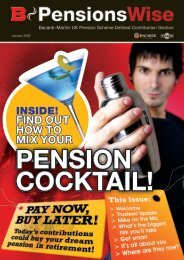point Talking Talking - PRAG
point Talking Talking - PRAG
point Talking Talking - PRAG
You also want an ePaper? Increase the reach of your titles
YUMPU automatically turns print PDFs into web optimized ePapers that Google loves.
<strong>Talking</strong><br />
<strong>point</strong><br />
Otto UK Pension Scheme<br />
September 2008
My word!<br />
OK, so I know a company<br />
pension scheme may not be<br />
the most exciting<br />
Say goodbye to ‘pensions speak’:<br />
company <strong>Talking</strong><strong>point</strong> aims to cut through the jargon to help you<br />
benefit that Otto UK gives its employees (unlike the great understand how your pension works and what you need to<br />
shopping discounts we get!), but research done earlier this do to stay on track for a financially secure retirement.<br />
year showed that a workplace pension is still considered<br />
As well as giving our active members some ideas on how<br />
the most important perk an employer can offer.<br />
they can grow their pension (page 10), we’ve also included<br />
However, while three-quarters (75%) of employees believe it a section dedicated to pensioners, highlighting ways<br />
is important to have a pension that comes with their job, they may be able to get more benefits from the State.<br />
less than half (48%) have confidence in pensions when<br />
I hope you find it an interesting read. Please let us know<br />
compared with other forms of retirement savings. A lot of it<br />
what you think (our contact details are on the back page).<br />
is down to the fact that pensions just seem SO complicated,<br />
and also the industry has had a lot of bad press in recent<br />
years. So, how do we close the gap? Well, a newsletter such Norman Finnigan<br />
as this one is a start.<br />
Chairman of Trustees<br />
2
what’s inside<br />
Money matters 4<br />
Investments<br />
Changes to our<br />
investment strategy 6<br />
Your pension and<br />
the credit crunch 9<br />
Top up your pension 10<br />
Update to funding position 12<br />
Pensioners’ pages 14<br />
Contact us 16<br />
3
Money<br />
matters<br />
4<br />
Every year, the trustees have to produce a full set of accounts showing how much<br />
money has been paid into the scheme, and how much has been paid out…<br />
Do you want to see<br />
the full report or<br />
any other scheme<br />
documents? Ask us<br />
for a copy - contact<br />
details are on page 16.<br />
We get our auditors (highly<br />
qualified accountants) to check<br />
that everything is ship-shape,<br />
giving you peace of mind that your pension savings<br />
are being accurately and correctly recorded.
Grattan Freemans<br />
section<br />
section<br />
£’000 £’000<br />
Money in<br />
The company paid in… 9,532 10,199<br />
Members paid in… 176 82<br />
Transfers in from other funds… 6 -<br />
Other income... 56 -<br />
TOTAL INCOME 9,770 10,281<br />
Money out<br />
Payments to members... 7,606 8,857<br />
Other payments... 153 47<br />
Administrative costs... 571 527<br />
Membership<br />
The Grattan and Freemans sections of the scheme are<br />
closed funds, so the number of active members in those<br />
sections will gradually fall as people leave the company<br />
or retire.<br />
The Money Purchase Section (which was introduced in<br />
2003) is open to all new Otto employees. In the past year<br />
159 new active members have joined the Otto UK<br />
Pension Scheme.<br />
Active members 2,957<br />
Pensioners 3,386<br />
TOTAL EXPENSES 8,330 9,431<br />
Value of scheme at 6 April 2007 £362 million<br />
Value of scheme at 5 April 2008 £354 million<br />
Other beneficiaries 381<br />
Deferred<br />
members 7,199<br />
Members of the Money Purchase section<br />
0 1,000 2,000 3,000 4,000 5,000 6,000 7,000 8, 000<br />
are sent an annual statement<br />
showing the current value of their<br />
individual retirement account,<br />
payments into it over the year, and<br />
an illustration of their projected<br />
pension at retirement.<br />
5
Investments<br />
The money paid into the scheme is invested by<br />
different investment managers across different<br />
‘asset classes’, so for example company shares<br />
(equities), and fixed-interest investments (bonds<br />
and gilts).<br />
The money paid in on behalf of members of the Grattan<br />
and Freemans sections is held in a pool (one for each<br />
section) from which all benefits are paid. Money Purchase<br />
members have their own individual retirement accounts in<br />
the scheme and use their pot of money to buy ‘units’ in<br />
different investment funds.<br />
6<br />
Hands off !<br />
The assets in the scheme are<br />
kept totally separate from the<br />
company’s assets<br />
New strategy to reduce risk<br />
in the pension scheme<br />
The trustees, on the advice of their investment consultants,<br />
have started to switch some of the assets that are held in<br />
equities (company shares) into corporate bonds and gilts.<br />
More details will be provided in next year’s newsletter.<br />
Bonds & gilts<br />
These are loans to companies or governments who<br />
need to raise money to finance projects. (Bonds issued<br />
and backed by the UK government are called gilts.) The<br />
amount of the loan is paid back on a specific date, and<br />
interest payments are made throughout the duration<br />
of the bond, giving a guaranteed stream of income to<br />
the investor. For index-linked bonds, the rate of interest<br />
is linked to inflation – so it increases when inflation is<br />
on the rise and decreases when inflation goes down.
Split of assets<br />
During the year under review, the assets of the three sections were invested in the following asset classes:<br />
0 1000 2000<br />
Grattan Section<br />
Money Purchase Section<br />
0 1000 20<br />
Freemans Section<br />
UK equities 28.6%<br />
Overseas equities 34.1%<br />
Fixed interest 17.7%<br />
Index linked 9.5%<br />
Property 10.1%<br />
UK equities 23.6%<br />
Overseas equities 34.5%<br />
Fixed interest 24.9%<br />
Index linked 6.8%<br />
Property 10.2%<br />
0 1000 2000 3000 4000 5000 6000 7000 8000<br />
UK & overseas equities 88.9%<br />
Index linked 8.9%<br />
Cash 2.2%<br />
0 1000 2000 3000 4000 500<br />
7
Who are the investment managers?<br />
Grattan Section: Legal & General, Marathon Asset<br />
Management, AllianceBernstein and Black Rock.<br />
Freemans Section: Legal & General, Barclays Global<br />
Investors and Black Rock.<br />
Money Purchase Section: Legal & General.<br />
One and three-year returns (annualised)<br />
1 year 3 years (annualised)<br />
Grattan Section -2.8% 9.4%<br />
Freemans Section -2.9% 8.4%<br />
Equitable Life AVCs<br />
Some members still have contributions<br />
invested in Equitable Life’s With-Profits<br />
Fund, which closed to new business<br />
in 2000. The latest development<br />
is a proposal from the Pensions<br />
Ombudsman to set up a compensation<br />
fund for Equitable Life policyholders.<br />
We are expecting the Government to<br />
respond in the autumn and will send<br />
you further information once the<br />
results are known.<br />
Money Purchase Section<br />
Equity fund -5.1% 10.1%<br />
Index-linked gilt fund 13.4% 8.2%<br />
Cash fund 5.8% 5.1%<br />
8
Credit<br />
squeeze?<br />
Equity markets performed well in the first half of the year<br />
set against a generally sound economic background.<br />
July and August saw the first sharp falls<br />
in share prices as investor confidence evaporated. What<br />
seemed, at first, to be a local problem with US sub-prime<br />
mortgage lenders, soon spread across global credit<br />
markets. As the crisis unfolded, inter-bank lending<br />
(the ‘lubricant’ of the financial system) became more<br />
expensive and liquidity problems emerged. Northern Rock<br />
was not the only victim of the lending drought, though<br />
it was certainly the most visible in the UK.<br />
The year 2007 will be remembered for the global<br />
‘credit crunch’ and, in the UK, for the sight of anxious<br />
customers waiting in line outside Northern Rock<br />
branches to withdraw their savings, in the first run<br />
on a UK bank for over a century.<br />
The credit crunch is not all bad news however –<br />
especially if you are a member of the Money Purchase<br />
section. Annuity rates (which govern how much pension<br />
you are able to buy with your retirement account) are at<br />
their highest levels in five years. That means you get<br />
more pension for your money – and it’s all thanks to the<br />
credit crunch.<br />
Why? The credit crisis caused financial institutions<br />
worldwide to stop lending to one another. With the<br />
resulting shortage of funds, big investors have sold all<br />
sorts of assets, including bonds issued by quality<br />
businesses. This has depressed corporate bond prices,<br />
but lifted their yields.<br />
The full impact of the credit crunch on economic<br />
growth cannot yet be assessed, but it will take some<br />
time before we return to ‘normal’ market conditions.<br />
It is important to remember that pension fund<br />
investing is for the medium to long term and any<br />
short-term fluctuations should not be viewed as<br />
having a significant impact on the scheme’s long-term<br />
financial position.<br />
9
Top tips<br />
for topping up<br />
your pension<br />
The average British pensioner is paid a state<br />
pension which is worth just a sixth (17%) of<br />
average earnings.<br />
You’ve joined the Otto UK Pension Scheme, so you’re not<br />
going to be one of those pensioners with nothing to live on<br />
but the state pension, right? Well… yes. But even so, on<br />
average, the average person can expect a 53% fall in<br />
income, even when state pension and other benefits are<br />
taken into account. Simply put: the more you can put aside<br />
for retirement, the better.<br />
When you’re young, other things take priority: paying off your<br />
student debt, building up a deposit for a mortgage, buying a<br />
nice car. But as you hit your 40s (and especially if you were late<br />
getting into the pension game or had a career break in the<br />
middle), you may want to think about making up any shortfall<br />
in your pension. We spell out some of the options here.<br />
10<br />
Through the company<br />
Company pension scheme<br />
The big advantage of the company pension scheme is the<br />
tax relief you get on your contributions – a basic rate<br />
taxpayer pays just 80p for each £1 in their pension fund.<br />
Plus, Otto makes contributions to your pension, too.<br />
Additional Voluntary Contributions (AVCs)<br />
This is a pension top-up arrangement run by Otto, which<br />
allows you to make additional retirement savings into<br />
an individual AVC account. When you retire, you use<br />
your AVC fund to provide extra benefits. Your AVCs are<br />
deducted from your pay before tax is calculated
(so you pay less tax), plus any money you make from<br />
investing them also attracts tax relief.<br />
They are flexible – you can stop and start them at any time,<br />
and you can also make lump sum payments when you find<br />
yourself with a bit of spare cash. You can also choose how<br />
the money in your AVC account is invested. Ask the Pensions<br />
Department to send you more information about AVCs.<br />
Personal plans<br />
Freestanding AVCs (FSAVCs)<br />
Similar to an AVC plan except that it is completely<br />
independent of the Otto UK Pension Scheme. You choose<br />
your own provider and make your own arrangements to<br />
pay contributions to your FSAVC plan. This means your<br />
contributions will not be deducted through payroll and you<br />
will not receive tax relief at source. Instead you will have to<br />
claim the tax relief from HM Revenue & Customs yourself.<br />
Stakeholder or personal pension plan<br />
These private pension schemes are run by banks,<br />
investment companies and building societies. You make<br />
your own arrangements to pay contributions to the plan.<br />
Other savings<br />
There are, of course other ways to save for your retirement<br />
other than by paying more pension contributions e.g.<br />
savings accounts, ISAs, unit trusts, etc. You could put money<br />
aside in a high interest savings account, but you will pay<br />
tax on the interest earned. The interest earned from cash<br />
ISAs is tax-free, but you are limited as to how much you can<br />
invest each year (£3,600 for 2008/2009).<br />
?<br />
live on ££90.70 a week?<br />
Could YOU<br />
That’s the current basic state<br />
pension for a single person but<br />
you’ll get even less because the<br />
taxman takes his share, too!<br />
11
Funding update<br />
Every three years, the scheme’s actuary<br />
(a specialist in the mathematics of risk) must<br />
calculate whether the Otto UK Pension Scheme<br />
has enough money to pay all the<br />
benefits promised to its members...<br />
12<br />
(This only applies to the Grattan and<br />
Freemans sections, as members in the<br />
Money Purchase Section have their<br />
own individual retirement pots.)<br />
The actuary has to consider things<br />
like future investment returns,<br />
inflation rates, and longevity (ie, how<br />
long members are expected to live,<br />
as longer average lifespans mean<br />
that pensions will be paid for longer).<br />
The last such investigation (or<br />
actuarial valuation) looked at the<br />
funding position as at 5 April 2006,<br />
and showed that the scheme<br />
had a shortfall of £106.1 million<br />
(£70.8m – Freemans Section;<br />
£35.3m – Grattan Section).
However, three years is a long time in the pensions world,<br />
so the trustees also ask the actuary to carry out a less<br />
detailed ‘actuarial check’ every year, to see how the funding<br />
position has changed over the past 12 months.<br />
The latest update (up to 5 April 2008) showed the position<br />
to be as follows:<br />
Freemans shortfall: £65.5m<br />
Grattan shortfall: £52.5m<br />
Combined shortfall: £118m<br />
The main reason for the larger shortfall has been poor<br />
investment returns coupled with higher liability values<br />
resulting mainly from concerns about higher inflation.<br />
The company currently pays the following amount into<br />
the scheme:<br />
Freemans: £8.5m a year until February 2016, towards paying<br />
off the shortfall and meeting running costs, plus 12.7% of<br />
pay for future benefits for current employees<br />
Grattan: £4.5m a year until February 2016, towards paying<br />
off the shortfall and meeting running costs, plus 11.2% of<br />
pay for future benefits for current employees<br />
Both sections: the company also pays member contributions<br />
for those employees who participate in SMART pensions.<br />
By law, the trustees also have to report on the hypothetical<br />
scenario that the scheme had been wound up on 5 April<br />
2008. In this case, the shortfalls would have been £161.5m<br />
(Freemans) and £164.1m (Grattan). These figures would<br />
normally only matter if the company became insolvent,<br />
which is not expected to happen. The shortfalls on<br />
winding-up assume that members’ pensions are provided<br />
by an insurance company, and so they allow for insurers<br />
taking a very cautious view of the future and the fact that<br />
they need to make a profit. Our funding plan, with its<br />
combined shortfall of £118m at 5 April 2008, assumes that<br />
the company will continue and carry on supporting the<br />
pension scheme.<br />
Trustees of all pension schemes are required to inform<br />
members that the Pension Protection Fund (PPF) has been<br />
established to pay compensation to members of eligible<br />
defined benefit schemes in the event that an employer is<br />
no longer able to meet the pension liability.<br />
The trustees are also required to confirm that there have<br />
not been any payments to the company out of the pension<br />
scheme since the last funding statement was issued, nor<br />
has the Pensions Regulator intervened in the funding of<br />
the scheme or the benefits provided by it.<br />
13
Pensioners’ pages<br />
Are you claiming pension credits?<br />
A recent newspaper report claimed that four out of 10 pensioners fail to<br />
claim pension credits, worth an estimated £2.5bn every year.<br />
You might think you’re not eligible for this top-up to the state<br />
pension because you’re already receiving a personal pension from<br />
the Otto scheme, but you may be pleasantly surprised. It’s worth<br />
finding out, because it could put an extra £19.71 into your pocket<br />
each week if you’re a single pensioner aged 65+<br />
(£26.13 per week for couples).<br />
If you find you’re eligible, you may receive up<br />
to three months’ backdated payments. Call the<br />
pension credit claim line: 0800 99 1234.<br />
Lines are open Monday to Friday<br />
between 8am-8pm.<br />
Useful numbers<br />
The Pension Service 8am-8pm,<br />
Monday to Friday 0845 60 60 265<br />
(or textphone 0845 60 60 285)<br />
www.thepensionservice.gov.uk<br />
Winter Fuel Payment Helpline<br />
8.30am-4.30pm, Monday to Friday<br />
0845 915 1515 (or textphone 0845<br />
601 5613)<br />
Pension Credit claim line: 0800 99 1234<br />
Age Concern<br />
0800 00 99 66<br />
www.ageconcern.org.uk<br />
Help the Aged<br />
020 7278 1114<br />
www.helptheaged.org.uk<br />
Citizens Advice Bureau<br />
www.citizensadvice.org.uk<br />
14
And what’s<br />
more…<br />
Age Concern reckons that many<br />
pensioners simply do not realise<br />
they can get financial help from the<br />
State and other organisations, so<br />
here are some of the ways you can<br />
make your money go further…<br />
Attendance allowance: if you’re 65 or<br />
over and have a disability or illness<br />
that means you need help with<br />
personal care (eg, dressing and<br />
washing) and/or supervision, you<br />
can get £43.15 to £64.50 a week.<br />
Cold Weather Payments: this benefit<br />
helps cover the costs of extra heating<br />
during periods of very cold weather;<br />
you do not have to pay tax on, or<br />
repay, any Cold Weather Payments.<br />
Winter Fuel Payments: these are<br />
tax-free payments of up to £200<br />
per household as soon as the eldest<br />
person in the home reaches age 60,<br />
with up to an extra £100 for people<br />
aged 80 or over.<br />
Help with health costs: depending on<br />
your personal circumstances you may,<br />
from age 60, be able to get free NHS<br />
eyesight tests and a voucher towards<br />
the cost of glasses or contact lenses,<br />
free NHS prescriptions, free NHS<br />
dental treatment, free NHS wigs and<br />
fabric support, and repayment of<br />
travel costs to hospital.<br />
Free television licences: if you are<br />
aged 75 or over, you are entitled to a<br />
free TV licence for your main home,<br />
although you will still need to register.<br />
Free travel: if you’re over 60, you may be<br />
entitled to free or half-price travel on<br />
Splash!<br />
From April next year, over-60s in<br />
England will be able to swim for<br />
free. The Government plans to give<br />
local authorities £80 million to make<br />
public swimming pools free to use<br />
for over-60s. (Wales already offers<br />
free swimming for over-60s, while<br />
in Scotland individual local<br />
authorities are responsible for their<br />
own pricing policies.)<br />
public transport (check with your local<br />
council). Also, if you buy a Senior Railcard<br />
(currently £24), you receive a third off the<br />
cost of most train tickets for a year.<br />
Free cavity wall/loft insulation:<br />
British Gas will offer to install this free<br />
of charge if you’re aged 70 or over, even<br />
if you’re not a British Gas customer.<br />
15
Contact us<br />
Members<br />
Grattan Section: 01274 624 638 / 625 957<br />
Freemans Section: 01274 624 087<br />
Money Purchase section: 01274 624 638 / 625 957<br />
Pensioners (pension payment queries)<br />
Grattan Section: 01737 241 144 (Watson Wyatt Ltd)<br />
Freemans Section: 01274 625 300 (option 4)<br />
Keep in touch<br />
Please remember to keep us informed if your home<br />
address changes, so that you can be kept up to date<br />
about your pension scheme and your retirement benefits.<br />
Pensioners are also reminded to let us know of any<br />
changes to your bank or building society details promptly<br />
so that there is no disruption to the payment of your<br />
monthly pension instalments.<br />
We welcome your feedback on this newsletter – please<br />
email a member of the Pensions Team with your comments:<br />
Julia Warren (julia.warren@otto-uk.com)<br />
Anne Robertson (anne.robertson@otto-uk.com)<br />
Ann Moorhouse (ann.moorhouse@otto-uk.com)


